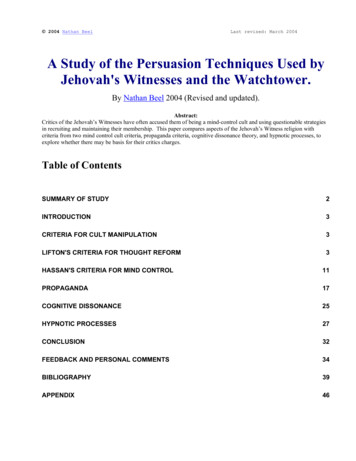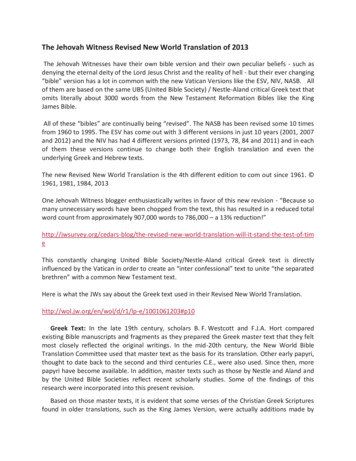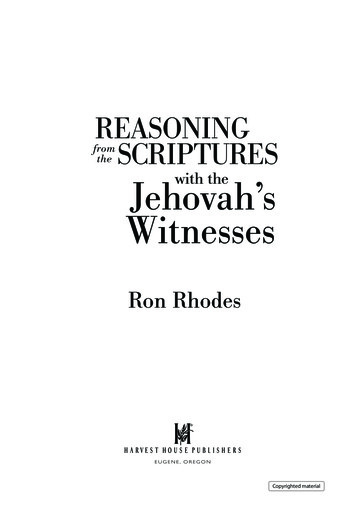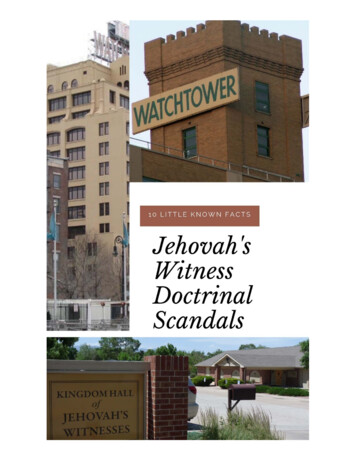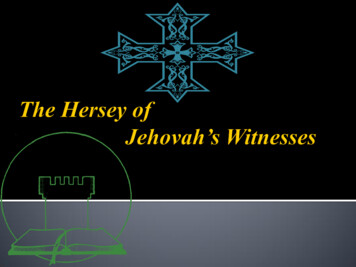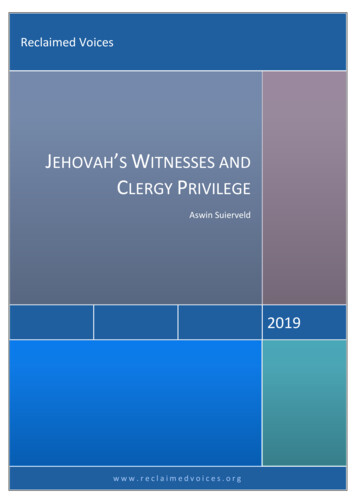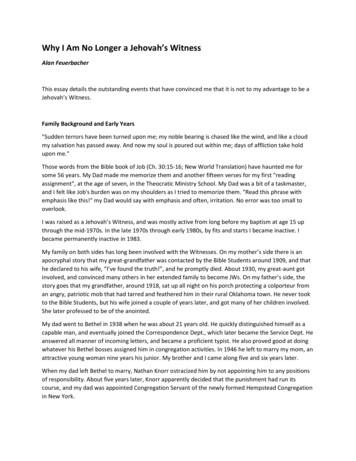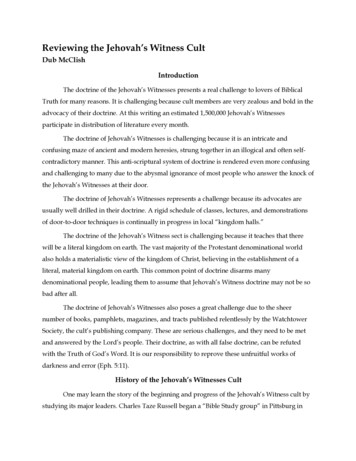
Transcription
Reviewing the Jehovah’s Witness CultDub McClishIntroductionThe doctrine of the Jehovah’s Witnesses presents a real challenge to lovers of BiblicalTruth for many reasons. It is challenging because cult members are very zealous and bold in theadvocacy of their doctrine. At this writing an estimated 1,500,000 Jehovah’s Witnessesparticipate in distribution of literature every month.The doctrine of Jehovah’s Witnesses is challenging because it is an intricate andconfusing maze of ancient and modern heresies, strung together in an illogical and often selfcontradictory manner. This anti-scriptural system of doctrine is rendered even more confusingand challenging to many due to the abysmal ignorance of most people who answer the knock ofthe Jehovah’s Witnesses at their door.The doctrine of Jehovah’s Witnesses represents a challenge because its advocates areusually well drilled in their doctrine. A rigid schedule of classes, lectures, and demonstrationsof door-to-door techniques is continually in progress in local “kingdom halls.”The doctrine of the Jehovah’s Witness sect is challenging because it teaches that therewill be a literal kingdom on earth. The vast majority of the Protestant denominational worldalso holds a materialistic view of the kingdom of Christ, believing in the establishment of aliteral, material kingdom on earth. This common point of doctrine disarms manydenominational people, leading them to assume that Jehovah’s Witness doctrine may not be sobad after all.The doctrine of Jehovah’s Witnesses also poses a great challenge due to the sheernumber of books, pamphlets, magazines, and tracts published relentlessly by the WatchtowerSociety, the cult’s publishing company. These are serious challenges, and they need to be metand answered by the Lord’s people. Their doctrine, as with all false doctrine, can be refutedwith the Truth of God’s Word. It is our responsibility to reprove these unfruitful works ofdarkness and error (Eph. 5:11).History of the Jehovah’s Witnesses CultOne may learn the story of the beginning and progress of the Jehovah’s Witness cult bystudying its major leaders. Charles Taze Russell began a “Bible Study group” in Pittsburg in
1870, which evolved into this strange religious organization. Although reared a Presbyterian, byage 15 Russell had become a Congregationalist. By the age of 16, he was sick of “organizedreligion” and had fallen into infidelity after unsuccessfully trying to “convert” an infidel friend.A visit on impulse to a rude Seventh Day Adventist hall prompted Russell to form his own“Bible Study group,” which was the embryo of the religious empire he would later direct andcontrol. His adherents soon came to be known as “Russellites.” He admittedly borrowed someof his doctrines from Adventist theology.At the age of 25 Russell was so boldly confident in his new religious leadership role thathe sold his interests in his father’s clothing stores for 250,000 and began devoting all his time toreligious activities. That same year (1877), Russell set forth in a booklet titled Three Worlds, orPlan of Redemption, his doctrine that Christ came invisibly in the fall of 1874. In 1879 he began amonthly publication he named Zion’s Watchtower and Herald of Christ’s Presence, the predecessorof the Watchtower magazine. By this time Russell was convinced that he was Divinely appointedto serve as the “witness of Jehovah” to all men.In 1886 Russell published a book titled, The Divine Plan of the Ages, which served as thefirst thorough summary and statement of his doctrinal system. The “Publishers’ Foreword” ofthe book called it the “priceless key to the Bible” and “the textbook supreme for aid in BibleStudy.” Russell wrote five other volumes in this Studies in the Scriptures series over the next 20years, and an additional volume was published posthumously.Scandal, opposition, and lawsuits marked the last several years of Russell’s life. Someprominent followers led an unsuccessful takeover attempt in 1893. In 1897, his wife of 18 yearsleft him and in 1903 sued him for divorce. A scandal ensued concerning improper conducttoward other women. Russell was sued for advertising “miracle wheat” in the Watchtower,guaranteeing that it would out-produce any other by 500%. When a Brooklyn paper exposedRussell’s claim, he sued for 100,000 libel damages, but lost the case. Russell’s lack of integrityand religious errors were amply demonstrated subsequently in several other instancesinvolving court cases and newspaper expose s.He was neither a theologian nor a scholar. He had not the faintest idea of how to“handle aright” the Word of God (2 Tim. 2:15). He was a self-ordained “pastor,” masqueradingas a prophet who would have better served the world as a haberdasher. His influence isattributable to egotism, singularity of purpose, determination, and gall. His bizarreinterpretations of Scripture appealed to many. When he transferred these to the printed page2
and distributed them all over the world, thousands were swayed by them. He died in Pampa,Texas, October 31, 1916, while en route by train from California to New York. It is no mysterythat the Jehovah’s Witnesses have never published a biography of their founder.The Watchtower Corporation unanimously elected a new president in January 1917—J.F. (“Judge”) Rutherford. Rutherford had practiced law for several years when two youngWatchtower girls came into his office to sell him some books in 1894, introducing him toRussell’s Watchtower Society. Russell began using Rutherford’s legal “skills” in some of hislawsuits, thereby gaining exposure among the Witnesses. By 1906 Rutherford was earnestly atwork in the movement. He fiercely attacked the doctrines of established churches, honoring no“sacred cows,” and eventually even attacked some of Russell’s prophetic interpretations,causing some division among the Witnesses. The followers of Rutherford constitute theJehovah’s Witness sect of the present. They have, in fact, repudiated some of the doctrines andprophetic speculations set forth by Russell, although they still adhere to his basic tenets.In 1918 Rutherford and seven other principals of the Society were sentenced to prisonfor sedition due to their rabid anti-war statements during World War I. After 9 months theywere released on grounds of an illegal conviction, and Rutherford returned to his post at theSociety as a martyr-hero who now had even more power than before.Rutherford began producing a stream of books that he declared to be “new revelationsfrom God.” He wrote faster than Watchtower presses could print. Selling these books from doorto door became a major emphasis by about 1930, and it continues to be the mainstay of theirpropaganda machine. In July 1931 at a Society convention in Columbus, Ohio, Rutherford gavethe name “Jehovah’s Witnesses” to the cult, hoping this would lay to rest such names as“Russellites” and “Millennial Dawn People.” He is credited with great administrative abilitythrough which he organized a tightly controlled, self-perpetuating theocratic dictatorship. Hedied on January 8, 1942.The mantle of leadership next fell upon the shoulders of Nathan H. Knorr. Born in 1905,he left the Reformed Church when he was 16 and became a Jehovah’s Witness. At 18 he was afull-time preacher and had been added to the staff at the Brooklyn headquarters. He hadworked his way up through the ranks and was the principal administrator of the Brooklynoffice during Rutherford’s last years. Although not as flamboyant and bombastic as Russell, orRutherford, Knorr was nevertheless a talented writer, speaker, and administrator. Whilecontinuing the relentless stream of books, magazines, and booklets, his major emphasis was on3
the doctrinal education of the rank-and-file Witnesses. Knorr changed the policy of authorshipcredits so that all articles and books from his time are published anonymously. This policyincludes their New World Translation of the Holy Scriptures, published in 1961. Said policy has twodistinct advantages for the Watchtower Society: (1) It prevents the glorification of leadingpersonalities in the cult, which had proved divisive in previous administrations, and (2) itmakes it impossible to challenge the scholarship or qualifications of the writers. Thus it isimpossible to learn from the Watchtower Society who even had a part in producing their NewWorld Translation (the linguistic qualifications of anonymous writers can hardly be questioned).Knorr’s administration was characterized by streamlining every part of the Society’soperations. He managed to avoid the scandalous lawsuits and headlines common to bothRussell and Rutherford, enabling the Jehovah’ s Witnesses to gain an unprecedented degree ofpublic acceptance. Knorr had about 115,000 disciples when he began his presidency in 1942. The1982 Jehovah’s Witness Yearbook said there were 172,859 full-time “pioneers” (i.e., preachers) with2-1/2 million members in 205 nations. If nothing else does, these growth figures shouldunderscore the seriousness of the challenge Jehovah’s Witness doctrine poses to the Truth of theGospel. Let us now consider some of the Witnesses’ fundamental errors.The Witnesses’ View of DeityIt is appropriate to begin a review of some major doctrines of the Witnesses with theirerrors on the concept of God. When one goes astray on the nature of Deity and the Godhead, hestarts down a path that will lead him into the “far country” on almost every Bible doctrine. Toattack the Biblical doctrine of the Triune Godhead is a major thrust of Jehovah’s Witness’doctrine.Russell wrote:Verily, if it were not for the fact that this trinitarian nonsense was drilled into us from ourearliest infancy and the fact that it is soberly taught in Theological Seminaries by gray-hairedprofessors in many other ways apparently wise, nobody would give it a moment’s serious1consideration (Studies in the Scriptures, Series 5, p. 166).Similarly, Rutherford wrote:Another lie made and told by Satan for the purpose of reproaching God’s name and turningmen away from God is that of the “trinity”. That there are three gods in one: God theFather, God the Son, and God the Holy Ghost, all equal in power, substance, eternity.findsno support whatever in the Bible, but, on the contrary, the Bible proves beyond all doubt thatit is the devil’s doctrine (Riches. pp. l85–188).4
An excellent illustration of the lengths to which they have gone to strip Christ from theGodhead is seen in their rendering of John 1:1 in their New World Translation: “In the beginningthe Word was, and the Word was with God, and the Word was a god” (emph. DM).The Witnesses contend concerning the Christ that:1. He was not co-existent and co-eternal with the Father:Prior to coming to earth, this only begotten Son of God did not think himself to be co-equalwith Jehovah God; he did not view himself as “equal in power and glory” with AlmightyGod. (Let God Be True, p. 34).2. He was Himself a created being known as Michael, the archangel:At that time [before Jesus’ birth, DM], as well as subsequently, he was properly known as “agod”—a mighty one. As chief of the angels.he was known as the Archangel (highest angelmessenger), whose name Michael signifies, “Who is God,” or God’s representative. As hewas the highest of all Jehovah’s creation, so also he was the first, the direct creation of God.”(Studies in the Scriptures, Series 5, p. 84).3. He was a mere mortal both before and during His earthly life:Men, angels, archangels, or even the Son of God, before and during the time he was “madeflesh and dwelt among us” were not immortal.all were mortal (Studies in the Scriptures,Series 5, p. 389).4. He did not differ from ordinary beasts in that His soul died:Thus we see that the claim of religionists that man has an immortal soul, and thereforediffers from the beast, is not Scriptural. He did not have an immortal soul: Jesus, the humansoul, died (Let God Be True, pp. 59, 63).These contentions led them even further astray concerning the nature of our Lord, butthese are sufficient to show their contempt for the Biblical doctrine of the incarnation and Deityof Christ.The Witnesses not only deny that the Holy Spirit is God, but that He is even a person:The words translated in our Bibles Holy Ghost should be properly translated holy spirit. Theholy spirit is the invisible power, energy, and influence of Jehovah. God is holy; therefore hispower, energy, or influence are holy (The Harp of God, p. 97).Far from teaching equality with Jehovah, the Scriptures show that the holy spirit is not even aperson (The Watchtower, July 15, 1957, p. 431).The man does not live who completely fathoms the exact nature of Deity, the TriuneGodhead, and the way the three persons possessed of Godhood relate to one another (althoughboth the Jehovah’s Witnesses and the “Jesus only” heretics suppose they do.). We should expectsuch to be the case; finite minds are not equipped to fully comprehend the Infinite Nature.Some matters are secret to humankind; they belong not to us, but only to God (Deu. 29:29a).Some (likely many) ways and thoughts of Jehovah are far above and beyond ours (Isa. 55:8–9);in the nature of the case, it must be so. However, the things God has revealed to us about5
Himself are ours to believe and act upon (Deu. 29:29b). While unable to understand all of themysteries of God and Godhood, we can most certainly understand (and we are under Divinemandate to accept) what God has revealed about Himself.There is no argument between Christians and the Witnesses on the existence of theeternal, self-existent, omniscient, omnipresent, and omnipotent God. The points at issue arethese:1. Are there three Persons possessed of full Godhead and Godhood or is there only a singleGod-person?2. Is Jesus Christ truly God or merely a created “mighty one”?3. Is the Holy Spirit a person possessed of Deity or merely the impersonal “influence” of God?That there is more than one member of the Godhead is apparent in even the earliestwords of the Bible. The word for “God” in Genesis 1:1 is a plural term (Elohim), allowing for thesubsequent Scriptural development of doctrine of the multi-person Godhead. It becomesimmediately apparent in Genesis 1 that more than one person is identified as God since Godsaid in verse 26, “Let us make man in our image, after our likeness” (emph. DM). To whom wasGod talking? He was speaking to Someone or Ones Who had power to create. Other OldTestament passages likewise use the plural pronoun in reference to God (e.g., Gen. 11:7; Isa. 6:8;et al.)The following facts and passages clearly indicate that the Father, the Son, and the HolySpirit compose the Godhead:1. All three participated in the Creation (Gen. 1:1-2; John 1:1-3, 10, 14; Heb. 1:2, 10, et al.).2. All three were present at the Lord’s baptism (Luke 3:22).3. When one becomes a Christian, he is baptized into the name of all three (Mat. 28:19).4. Paul distinctly mentioned all three (Rom. 15:30; 2 Cor. 13:14).5. The Father is called “God” (1 Cor. 8:6; Jam. 1:27, et al.).6. The Son is called “God” (Isa. 9:6; John 1:1; 5:17–18, 23; Phi. 2:5–6, et al.).7. The very attributes of the Father are also those of the Son (John 14:7–9).8. The Holy Spirit is called “God” (Acts 5:3–4).9. The Holy Spirit is referred to with the masculine singular pronoun—He, which could notproperly refer to a mere “influence,” but necessarily implies a person (John 16:13–15; et al.).6
10. The attributes of the Father and the Son are credited to the Holy Spirit in numerous passages.The Witnesses argue that since Christ is subordinate to the Father and since the Spirit issubordinate to the Son, therefore the Son and the Spirit cannot be God. While some sort ofsubordination among the Sacred Three is indeed observable in Scripture, such does not precludethose subordinated from possession of Godhood. A man’s wife and children are to besubordinate and submissive to him (Col. 3:18–20), but this does not preclude their humanity.The Witnesses especially emphasize two passages in their blasphemous rejection ofChrist’s Deity. The first passage refers to Christ as the “firstborn of all creation” (Col. 1:15).2This, they say, teaches that Jesus was the first thing God created and is therefore not Deity.However, their ignorance of the word translated “firstborn” (prototokos) is the pivotal issue. Theword does not signify first in time, but first in importance or preeminence. The context itselfshows this to be the whole point of the passage: “All things have been created through him andunto him; and he is before all things, and in him all things consist” (vv. 16–17). It is evident thatChrist could not be both before all things and the first thing created as well. This passage,when read as a whole, is a devastating blow to the Witnesses’ God-denying doctrine.The second passage speaks of Christ as “the beginning of the creation of God” (Rev.3:14). Again, the Witnesses argue that this statement means that Christ was the first beingcreated. However, the word translated “beginning” is arche, referring not to beginning as toorder, but as to cause. This passage is simply saying that Christ is the One who caused allcreated things to be, as various passages affirm (cf. John 1:1; 1 Cor. 8:6; Heb. 1:2; et al.).The Witnesses heap ridicule upon those who profess to believe in three Gods instead ofone God. However, they miss the point altogether, for none who has any degree of Scripturalunderstanding of God believes any such thing. Even the Witnesses, I would suppose, canunderstand how a husband and wife can still be two persons yet be a unified whole whenmarried (Gen. 2:24). Likewise, the Scriptures teach that while the Father, the Son, and the HolySpirit are three persons, yet they constitute a unified whole called “the Godhead” (Acts 17:29).Again, while no sane mortal would profess to understand all of the mysteries concerning thenature of God, we can understand the Biblical teaching that these three persons are God. Simplyput, denial of these facts constitutes heresy.Christ is no angel, not even an archangel. He is the Son, the Ruler, the Creator, and theeventual Destroyer of the world, whom the angels worship (Heb. 1:5–13). Indeed, “In him7
dwelleth all the fulness of the Godhead bodily” (Col. 2:9). How demonic is the doctrine of anywho would make of the Son of God a mere creature hardly differing from the beast of the field.The Witnesses’ View of ManThe aversion of C.T. Russell to the existence of an eternal place of torment called “Hell”produced a terribly warped view of the nature of man. Perhaps because he was disturbed abouthis own eternal destiny, he invented a concept of the nature of man that would convenientlyrelieve his anxieties. His view of the soul of man is based on a very restricted definition of theterm. Probably the favorite passage of the Witnesses on this subject is Genesis 2:7: “AndJehovah God.breathed into his nostrils the breath of life; and man became a living soul.” Fromthis passage they affirm: “The truth is that every man is a soul; no man has a soul” (Deliverance,p. 337). To the Witnesses soul means only animal life and breath:The body aside from the breath does not constitute the soul; but it requires the uniting of thebreath with the body to constitute the soul. And when we separate the breath from the bodythe soul no longer exists” (The Harp of God, p. 42).Out of this very limited and perverted view of the meaning of soul came the doctrinesometimes called “soul-sleeping.” However, this is far too mild a description of the doctrine, asthe following citations reveal:As the natural sleep, if sound, implies total unconsciousness, so with death, the figurativesleep; it is a period of absolute non-existence. So soon as the spark of life is gone, soul orbeing has ceased (Studies in the Scriptures, Series 5, pp.329, 342).When a man dies, he is as dead as a dead dog (Deliverance, p. 337).Russell therefore taught the following concerning our Lord: “He was put to deatha man but was raised from the dead a Spirit Being.the man Jesus is dead, forever dead”(Studies in the Scriptures, Series 5, pp. 453–54). Later Watchtower publications echoed thisconcept: “He did not have an immortal soul: Jesus, the human soul, died” (Let God Be True,p. 63). It is clear that this doctrine of death is one of absolute annihilation and nonexistence, rather than of mere “soul-sleeping.”While it is true that man is a soul and that Scripture sometimes uses soul to refer to his“animal” life, it is also true that he has a soul, and that soul is used to refer to a part of man’snature that is distinct from animal life and breath. God, being spirit (John 4:24), has no physicalbreath, yet He has a soul (Lev. 26:3; 1:14; Mat. 12:18). The soul and body of men aredistinguished clearly in Matthew 10:28: Man can kill the body but cannot kill the soul; only Godcan destroy soul and body in Hell. There is an “outward man” and an “inward man” (2 Cor.8
4:16). Man has a “spirit” that is distinct from his “flesh” (Mat. 26:41; 1 Cor. 5:5). The “salvationof the soul” refers to more than preservation of physical life and breath (Heb. 10:39; 1 Pet. 1:9).John saw the souls of those whose bodies had been slain by decapitation (Rev. 20:4; cf. 6:9–10).Surely, their physical breath had ceased, but their souls were much alive.The weight of Scriptural evidence showing that the invisible, spiritual soul of man isimmortal is conclusive to any reasonable and reverential mind. Man is made in the image andlikeness of God (Gen. 1:26), but since God is not a flesh and blood creature, man’s mortal,physical nature is obviously not that likeness. It follows that the immortal, spiritual nature ofman is that which is after the likeness of God. When man dies his body returns to the dust, buthis spirit returns to God who gave it (Ecc. 12:7). Matthew 10:28 not only emphasizes thedistinction between man’s soul and body; as already noted, it also clearly affirms that the soulof man cannot be killed like his body can be. That which cannot be killed is immortal—it goeson living indefinitely, and such is the case with the soul of a man. Moses and Elijah continued tolive centuries after their bodies had died and decayed; God caused them to reappear (Mat. 17:3–4). Jesus declared that Abraham, Isaac, and Jacob were still living (22:32). Although our bodieswill perish, our spirits or souls will not (Mat. 25:46; John 5:28–29; 2 Cor. 4:16–5:10).A fair test of the Witnesses’ doctrine of the soul is to substitute breath for soul in a fewpassages. If soul means only breath, then either word will make equal sense. If any of thepassages are made nonsensical by such substitution, it will be obvious that their definition ofthe human soul is absurd and palpably false. Psalms 19:7: “The law of the Lord is perfect, converting the breath.” Ezekiel 18:4: “The breath that sinneth, it shall die” (reward for severe halitosis, perhaps). Luke 12:19: “I will say to my breath, breath, thou hast much goods laid up for many years.” Acts 2:41: “There were added unto them in that day about 3,000 breaths.” Acts 2:43: “Fear came on every breath.” Hebrew s 13:17: “Obey them that have the rule over you.they watch in behalf of yourbreaths.” 1 Peter 1:22: “Seeing ye have purified your breaths in your obedience to the truth.” (theScriptural mouthwash for that terrible halitosis).By every Scriptural test the Witnesses’ doctrine of the soul of man and its immortality istotally false, but beyond that, its practical implications are monstrous and horrendously evil.9
The Witnesses’ View of Sin and SalvationAs with other doctrines propagated by the Witnesses, their doctrines relating to sin andsalvation are a deadly mixture of some truth and much error. While they correctly define sin asdisobedience to God and admit the free agency of man to obey or disobey God, they errgrievously on other matters closely related. They hold the Augustinian-Calvinistic views ofinherited Adamic sin and total depravity: “Just as parents today often pass sicknesses on totheir children, so Adam and Eve passed sin and death on to theirs. Their children were uncleanin God’s eyes” (Paradise, p. 35). One of Russellism’s grossest errors relates to the consequence ofsin. As previously indicated, to them “death,” which is caused by “sin,” equals annihilation, astate of non-existence: “When a human creature dies nothing survives—no soul—no body”(Make Sure of All Things, p. 241). When a person dies, he “.would become as when he had notbeen” (Paradise, p. 28).The Witnesses make rather typical denominational errors in their teachings on the planof salvation. They rest one’s salvation on faith alone: “The only ground of salvation mentionedin the Scriptures is faith in Christ as our Redeemer and lord” (Studies in the Scriptures, Series 1,p. 100). While teaching the necessity of repentance before baptism and rejecting sprinkling,pouring, and infant “baptism,” they also deny the necessity of baptism for salvation. They statethat “.repentance must precede, but sins are not washed away by baptism” (Make Sure of AllThings, p. 30). They reveal the function of baptism in their doctrine as follows:“ . water baptism is an outward symbol, as a testimony before witnesses, of the bapt1zedone’s complete, unreserved, and unconditional dedication and agreement to do the will ofJehovah.” (ibid, p. 27).Their “plan of salvation” includes the necessity of Holy Spirit baptism for those who willbe in the Heavenly Kingdom. One “.will never enter the kingdom of the heavens to reign withChrist.” nor “.become a member of the body of Christ.” who are not baptized with the HolySpirit (New Heavens and a New Earth, p. 306). Further, those bound for the Heavenly Kingdomare limited to only 144,000. Any over that number who wish to be saved will have to be contentwith being a part of the kingdom on a renovated, perfected earth:These [144,000, DM] are the only ones whom Jehovah God takes to heaven with his Son. Allothers who gain life in His new world will live in a paradise restored here on earth (FromParadise Lost to Paradise Regained, p. 153).10
Now join me in briefly examining their errors as set forth above. The Bible explicitlyteaches that sin is not inherited, passed down from generation to generation; each person isaccountable to God for one’s own sins:The soul that sinneth, it shall die: the son shall not bear the iniquity of the father, neither shallthe father bear the iniquity of the son; the righteousness of the righteous shall be upon him,and the wickedness of the wicked shall be upon him (Eze. 18:20).True, the Bible teaches that death is the consequence of sin (Gen. 2:17; Eze. 18:4; Rom.6:23, et al.). However, the monstrous error made by the Witnesses on these passages is to forcetheir arbitrary meaning of annihilation upon the word death in every case. If death always meanstotal destruction or annihilation, we should be able to substitute annihilation for death in any textwithout changing the sense. This will hardly be the case, as a few examples will demonstrate: Matthew 8:22: “Leave the annihilated to bury their own annihilated.” Luke 15:32: “For this thy brother was non-existent, and is alive again.” Romans 6:7–8: “For he that hath been utterly destroyed is justified from sin. But if we wereannihilated with Christ, we believe that we shall also live with him.” Philippians 1:21: “For to me to live is Christ, and to be totally obliterated, is gain.”Death actually means loss or absence of life, and the context must determine what kindof life is under consideration. From the account of the rich man and Lazarus it is obvious thatwhen men cease to live physically, they do not cease to live in every way or become nonexistent (Luke 16:22–23). All men die physically, but their souls remain conscious in the realm ofHades while awaiting the Day of Judgment (Luke 16:22–31; Heb. 9:27).Men are saved by faith (as the Bible consistently teaches), but not by faith as the “onlyground” of salvation. The kind of faith that saves is that which lovingly works (Gal. 5:6). It isinsufficient merely to say, “Lord, Lord” (indicating faith), even if one is sincere in thatprofession. Men must obey God’s will (Mat. 7:21). Christ is the author of eternal salvation, notto those who merely believe, but to all those who obey Him (Heb. 5:9). It is no wonder thatJames clearly wrote that faith apart from works is barren and dead and that by works a man isjustified, and not only by faith (Jam. 2:20–26, emph. DM).The Witnesses say, “.Sins are not washed away by baptism,” but Scripture says, “. bebaptized, and wash away thy sins.” (Acts 22:16). If all the Witnesses mean is that the water ofbaptism does not cleanse men of, sin, they would receive a hearty “amen” from faithful saints. Ihave made such a statement hundreds of times over the years in sermons and in writing. It is11
the blood of Christ alone that cleanses (Rev.1:5) and redeems (1 Pet. 1:18–19). However, theirdoctrine is that the act of baptism has nothing to do with forgiveness of sins. This is a blatantdenial of New Testament teaching. While it is Christ’s blood that cleanses, a host of passages,including Acts 22:16, demonstrate unmistakably that the act in which the cleansing takes placeis baptism in water (Mark 16:16; John 3:5; Acts 2:38; 8:35–39; 10:47–48; 22:16; Rom. 6:3–4; 17–18;1 Pet. 3:21, et al.). Baptism may in some sense be a “sign” of one’s complete dedication to Christ,but it is far more than merely that. God does not forgive one’s sins before one submits to thecommand of Christ to be baptized.The Witnesses are amazingly inventive on the Holy Spirit. First, as earlier discussed,they deny His existence, except as sort of a righteous influence of God. Then they say that onemust be baptized in this One Who does not even exist in order to go to Heaven. In the two (andonly two) recorded cases of Ho
Russell and Rutherford, enabling the Jehovah' s Witnesses to gain an unprecedented degree of public acceptance. Knorr had about 115,000 disciples when he began his presidency in 1942. The 1982 Jehovah's Witness Yearbook said there were 172,859 full-time "pioneers" (i.e., preachers) with 2-1/2 million members in 205 nations.



